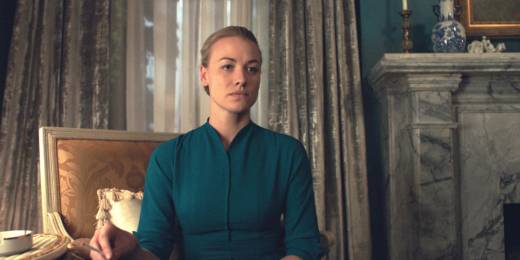Earlier this year at the White House Correspondents' Dinner, comedian Michelle Wolf told Press Secretary Sarah Huckabee Sanders, "I love you as Aunt Lydia in The Handmaid's Tale." A more accurate comparison from Margaret Atwood's story, however, might have been to Mrs. Serena Joy Waterford. Aunt Lydia is responsible for training new handmaids and keeping them in line by any means necessary (cattle prods and hand-burning ceremonies included), but it is Mrs. Waterford that poses the most complex questions for 2018 audiences.
Though Season 1 made clear that Mrs. Waterford had a hand in the formation of Gilead and its policies, Season 2 is now showing the full extent of it. In episode 6 -- "First Blood" -- we see her, in her pre-Gilead life, enthusiastically taking on speaking engagements about her family values book, "A Woman's Place," in the face of increasingly hostile protesters.
In 2018, scenes of angry division are soberingly familiar. In recent years, the world has seen all manner of guest speakers cause chaos on college campuses. In 2015, second-wave feminist Germaine Greer faced protesters at a British University over her anti-transgender comments, and Milo Yiannopoulos caused chaos on his own college tour. Earlier this year, protesters disrupted a talk from anti-feminist figure Christina Hoff Sommers.
Mrs Waterford isn't just realistic then, she is totally recognizable. We already know her. She is a woman who does not support the rights of other women. She is a woman whose ideas about gender roles are informed by her religious leanings. And if she existed in real life, you can bet your bonnet she'd be heading up a local chapter of Concerned Women for America (an organization that, like the Waterfords, believes "secular thought threatens the values we hold dear"). She'd also probably be hitting Fox News to talk about it at every opportunity.


